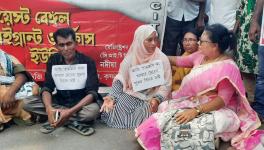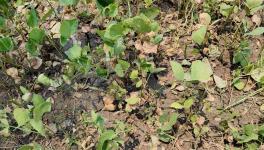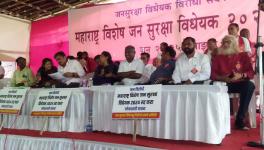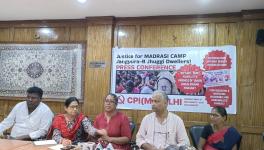Everyday Struggles of Girijan Sangham in Vizag’s Agency Areas
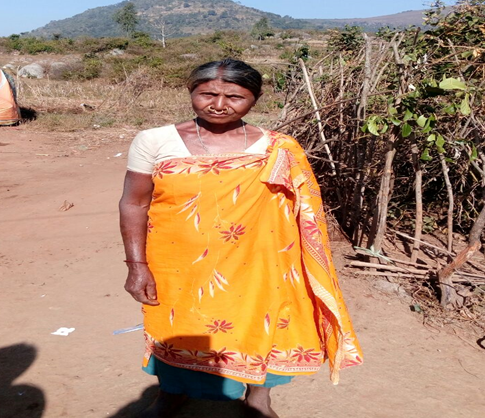
The distress of 69-year old Murlimmo, a resident of Pulmanvalsa village in Araku Taluka, Vishakapatnam is no different from other elderly member of Kodu community, classified as Particularly Vulnerable Tribal Group (formerly known as Primitive Tribal Group) in the region. Pointing out mistakes in her Aadhaar, officials told her that she won’t be able to get a home as promised to the victims of Cyclone Hudhud that hit the coastal state in 2014. Displaying a cavalier attitude, Andhra Pradesh government has abandoned the construction of beneficiary shelters for the victims blaming the ‘presence of Maoists’ in the region.
Murlimmo presently stays in a makeshift shelter where hens and ducks nest along with her. Her husband had died in Cyclone Hudhud. Although on paper she was given Rs 5 lakh compensation, actually she never received any amount. Kondas (whose population dwindled from nearly 1000 to 65 in less than a decade) are an endangered tribe in the government‘s list. Tribal communities that practice hunting and gathering (no agriculture), whose population growth rate is zero or negative and whose literacy rate is very low are classified as PVTGs.
Wary of the Maoists and other local political parties, Murlimmo sees hope in Girijan Sangham, a tribal organization of which she is also a member. The Girijan Sangham is acting as a confluence of adivasis, aiming to save the 90% tribal population from extinction under the dragnet of remaining 10% non-Tribal upper caste residents of the region.
Accompanied by Ramu and Chandu, SFI members from the PVT group and by Surendra, leader of Girijan Sangham, we reached Pulmanvalsa village in the second week of February. Located on Araku-Koraput-Malkangiri border, Pulmanvasla falls in Mabala gram Panchayat.
In Araku, most of the trade and commerce operations of the 42 shandies (Adivasi Markets) are controlled by the non-tribals. The Tribes are frequently duped by bartering inferior quality items – soaps, shampoos, Nylon shirts , and jewelry and so on - in exchange of fresh produce like apples, coffee and vegetables grown in the valleys of the Agency area. Though this exploitation was not the headache of the Maoists, but it became the focus of the Girijan Sangham.
Threatened by the Maoists, the programme of ‘self defence of the Tribals’ with traditional tools has become quite popular amongst the Tribes of the agency area.
Paradoxically, the AP State Government under Chandrababu Naidu has taken the decision to takeover about 11 lakh hectares of land for coffee cultivation in the valleys. However, the government has still not announced the Minimum Support Price (MSP) for Coffee, which is currently selling as low as Rs 82 per kilo as opposed to Rs 240, which is the demand of the Girijan Sangham activists.
“Actually the ruling class is involved in the laissez faire plunder of tribal assets, both visually and non-visually. This example of exploitation is only the tip of the iceberg,” said K Surendra ,former ZPTC member and CPI(M) state committee member. In fact, he added, on paper, every Taluka in the Agency areas has a super specialty hospital, but in reality, there are no medicines, enough doctors and even nurses to attend the poor tribals. For example in Pulmanvalsa village, so far, there has been not a single case of child birth in the hospitals. “This is 2018, but in these villages, the government takes us back in a Time Machine.”
While snake bites, dog bites and scabies are the usual nightmares in these areas, medicines for them are not available in hospitals or health centres in the region and patients are not provided with day or night food in the hospitals. Today, Girijan Sangham, after the Government negated its demand in this respect, runs community kitchens in these hospitals, which is a huge success.
Taking the medical facilities to farther border areas such as Malaba, Chintapallu and Matsakund areas, the Girijan Sangham ran medical units where its activists including former Member of Parliament and Doctor M Babu Rao participated and treated the tribals for several days. A school, Sarada Vidyaniketan, running solely on donations from the tribal communities of the agency areas has also been set up where Adivasi children study at free of cost.
“However the core struggle revolves around the attempts of the ruling classes to start bauxite mining in the agency areas,” said K Surendra. In view of the availability of huge bauxite reserves in these areas, since 2000, the government is trying to dislodge the tribes from their forest areas and simultaneously giving mining rights to foreign multinationals and their Indian agents.
In 2017, when a Gulf based MNC Ras-al Khaima, along with its Indian corroborator Jindal group, attempted to start bauxite mining and set up an aluminium plant, it was thwarted by the people who revolted against it at the call given by Girijan Sangham. Lakhs of tribals from all seven mandals of the Agency areas participated in protest marches across 224 villages. More than 100 such marches have been organised so far.
In the fifth scheduled areas, the consent of gram sabha is mandated for any governmental activity, but the AP government has a record of bypassing the obligation and had taken many decisions through the Cabinet. CPI(M) along with Girijan Sangham has been waging continuous struggles against this.
MV Sharma, former MLC from Visakhapatnam had earlier written to the Speaker and to secretaries exposing such maneuvers. CPI(M) leaders held ‘padayatras’ in the regions and forced the govt. to issue the ‘GO 97 abeyance’ order, thereby stalling the proposed Bauxite mining process. ‘GO 97’ was a govt. order opening up the area for bauxite mining.
Get the latest reports & analysis with people's perspective on Protests, movements & deep analytical videos, discussions of the current affairs in your Telegram app. Subscribe to NewsClick's Telegram channel & get Real-Time updates on stories, as they get published on our website.












